
July 11
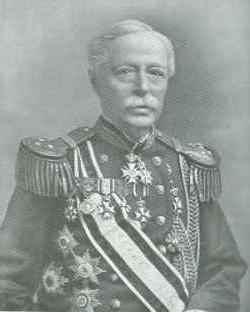
1863 Japan: After having been warned away by the passing vessel Kienchang, Captain François de Casembroot, commanding the 16-gun Dutch warship Medusa, ignores the warning and sails into Shimonoseki Strait. Fukuoka Takachika bombards the Medusa with more than thirty shells, killing or wounding nine seamen. De Casembroot returns fire and then retreats. (Satow, Craig)
[See: Countdown to Infamy: Timeline to Pearl Harbor.]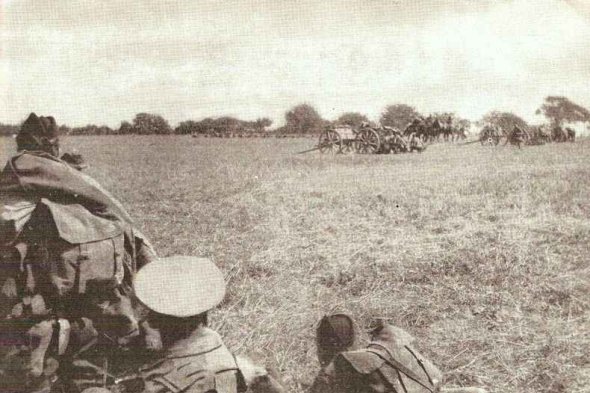
1915 World War I: List Regiment: Gefreiter Adolf Hitler's 16 Reserve Infantry Regiment continues to occupy a position at Fromelles, on a level field with water channels, willow trees and willow stalks. In the distance towards the enemy lines lies an insignificant wood with barbed wire entanglements. Under the direction of their defense-minded commander, Lieutenant General Gustav Scanzoni von Lichtenfels, the regiment works ceaselessly day and night to further fortify their position at Fromelles while fighting off repeated assaults by the enemy. [For further details, Click here.]
1916 World War I: List Regiment: Gefreiter Adolf Hitler endures trench warfare in Flanders (Artois) with 3 Company, 16 Reserve Infantry Regiment. [For further details, Click here.]
1917 World War I: List Regiment: Gefreiter Adolf Hitler's 16th RIR remain deployed for Phase 1 operations in Flanders, Belgium. [For further details, Click here.]
1918 World War I: Various:
German final plans for renewed offensive on the Western Front:
Even with a deadly influenza epidemic spreading among German troops, the German High Command decides to go ahead with plans for a renewed assault on the Allies on the Western Front in the summer of 1918.
Enrico Caruso records "Over There" written by George M. Cohan.
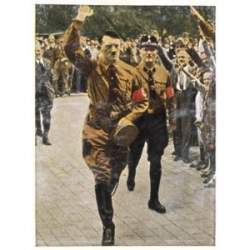
1921 Weimar: Hitler resigns from the Nazi party because he has not been given the dictatorial powers he seeks. He is betting that they cannot do without him. (See 26 July)
1933 Holocaust: Germany:
Immediately after assuming power in 1933, the Nazis make the "expulsion of Jews from German society" one of their top priorities. They start a propaganda and terror campaign of unprecedented scope and violence to stigmatize German Jews, isolate them from the rest of the population, and force them to emigrate.
The Nazis also appeal to the traditional anti-Jewish attitudes in the population to gain approval for their regime. Anti-Semitism becomes the propagandistic rallying point of the "German Revolution." As it remains the only "revolutionary" policy the Nazis pursue with any seriousness, its successes are constantly proclaimed in the press and radio and displayed on the "Stuermer" wall newspaper in every town and village.
Beginning with a call to boycott Jewish shops and businesses in 1933, measure after measure is introduced to expel Jews from the civil service, the professions, and from one economic sector after another. Gradually, German Jews are pushed to the margins of society. With the Nuremberg laws in 1935, they lose legal equality - three generations after emancipation - and full citizenship. At the same time, the regime introduces ever new regulations to strip Jews of their property before they are forced abroad.
1936 The Berchtesgaden Agreement regarding the maintenance of Austrian sovereignty is negotiated between Franz von Papen and Austrian Chancellor Schuschnigg:
1) The German Government recognizes the full sovereignty of the Federal State of Austria in the spirit of the pronouncements of the German Fuehrer and Chancellor of 21 May 1935.
2) Each of the two Governments regards the inner political order (including the question of Austrian National Socialism) obtaining in the other country as an internal concern of that country, upon which it will exercise neither direct nor indirect influence.
3) The Austrian Federal Government will constantly follow in its policy in general, and in particular towards Germany, a line in conformity with leading principles corresponding to the fact that Austria regards herself as a German State. By such a decision neither the Rome Protocols of 1934 and their additions of 1936, nor the relationships of Austria to Italy and Hungary as partners in these protocols, are affected. Considering that the detente desired by both sides cannot become a reality unless certain preliminary conditions are fulfilled by the Governments of both countries, the Austrian Federal Government and the German Government will pass a number of special measures to bring about the requisite preliminary state of affairs.
From the secret part of this agreement, the most important provisions of which have been summarized by Mr. Messersmith, Austria would:
(1) appoint a number of individuals enjoying the Chancellor's confidence but friendly to Germany to positions in the Cabinet;
(2) would devise means to give the 'National opposition' a role in the political life of Austria and within the framework of the Patriotic Front, and
(3) would amnesty all Nazis save those convicted of the most serious offenses.
1937 World War II: Second Sino-Japanese War: The Imperial Japanese Army engaged the Republic of China's National Revolutionary Army on Beijing's Marco Polo Bridge, marking the beginning of the Second Sino-Japanese War.
1940 World War II: Various:
France: Dijon is taken and to the east Guderian's units have reached the Saone. The Maginot Line is breached near Colmar in Alsace.
France: French President Lebrun resigns and Marshal Petain becomes head of state after an overwhelming vote of confidence in the Vichy Parliament. For the terms of the President's appointment, click here.
In London, France asks Britain to be released from the obligation not to make a separate peace. In return the British make an offer to establish a state of union between the two countries, but this rather wild scheme is rejected by the French.
Battle of Britain: On the Channel coast there are more evacuations. From St. Malo during the next two days 21,474 Allied troops are taken off and from Brest 32,584. The evacuations from St. Nazaire and Nantes take three days and carry 57,235 away but over 3000 are lost when the Lancastria is sunk by German bombers. Over the next two days, the Luftwaffe makes a series of attacks against shipping in the English Channel. The Germans lose a total of 93 aircraft, the British 48.
Sea Lion: Hitler issues Directive No. 15 outlining the details of Operation Sea Lion, the German invasion of the British Isles. In advance of the landings, the Luftwaffe is to begin operations against British defensive positions, airfields, and radar installations along the southern coast of England by August 15. 2,600 aircraft have been earmarked for this purpose.
Operation Sealion looked simple in theory. Britain should have been an easy target. The Luftwaffe was very experienced in modern warfare, the Wehrmacht had experienced astonishing success since the attack on Poland, and the British had lost a vast amount of military hardware on the beaches of Dunkirk. The RAF and the Army in Britain looked weak; only the Royal Navy seemed to offer Britain some semblance of protection. [See: Why Did Hitler Lose The Battle of Britain?]
1941 World War II: USA: President Roosevelt orders the establishment of the OSS (Office of Strategic Services), with Colonel Donovan as director:
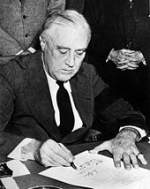
[After] the German invasion of Poland in 1939, President Franklin D. Roosevelt decided that U.S. intelligence operations needed unified command. In July of 1941, he named William J. Donovan, a New York lawyer and Medal of Honor recipient, as the nation's Coordinator of Information. As its Coordinator, Donovan led this new agency, the Office of Strategic Services, in collecting and analyzing intelligence and conducting special operations, especially in Europe and Asia. As the war progressed, Major General Donovan became the commander of more than 12,000 OSS operatives, military and civilian. The military's Joint Chiefs of Staff supervised the OSS. OSS agents helped guide the 1942 Torch landings in North Africa, supported Allied bombing campaigns in Europe, and conducted guerilla activities in Yugoslavia, Burma, and other countries. President Harry S. Truman dissolved the OSS in October 1945.
1943 World War II: Various:
Start of the "Peter and Paul Action" in Wolyn: This campaign of ethnic cleansing by the OUN-UPA involves the mass slaughter of non-Ukrainian citizens, especially Poles.
Allied invasion of Sicily: German troops launch a counter-attack on Allied forces in Sicily.
Operation Citadel: Finally admitting that, despite the maximum efforts by the German forces to break through the Soviet defenses, no further gains can be made, Hitler orders the suspension of Operation Citadel. Though the Wehrmacht is able to extricate most of its depleted forces from a potential disaster—a second Stalingrad—this outcome of the battle represents a tremendous victory for the Red Army and portends the end of German offensive operations in the East.
1944 World War II: Various:
FDR declares he will run for a fourth term as President of the United States:
When Roosevelt was nominated for a fourth term in office, America was heavily involved in World War II and there was a strong desire to keep him in office through the course of it. However, Roosevelt's health was declining and the Democrats spent some time deciding who would be his vice presidential nominee. They wanted to make sure that they chose someone who would be a good president, seeing that he would have a strong possibility of taking over during the term. Harry S. Truman was eventually picked to be second in charge because he was a moderate Democrat who appealed to the party center. [For further details, Click here.]
Hitler is paid a visit by his would-be assassin: Count Claus von Stauffenberg, a German army officer, transports a bomb to Adolf Hitler's headquarters in Berchtesgaden, in Bavaria, with the intention of assassinating the Fuhrer.
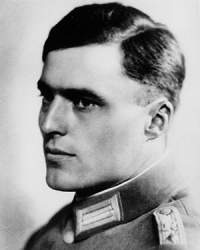
As the war started to turn against the Germans, and the atrocities being committed at Hitler's behest grew, a growing numbers of Germans-within the military and without-began conspiring to assassinate their leader. As the masses were unlikely to turn on the man in whose hands they had hitherto placed their lives and future, it was up to men close to Hitler, German officers, to dispatch him. Leadership of the plot fell to Claus von Stauffenberg, newly promoted to colonel and chief of staff to the commander of the army reserve, which gave him access to Hitler's headquarters at Berchtesgaden and Rastenburg.
Stauffenberg had served in the German army since 1926. While serving as a staff officer in the campaign against the Soviet Union, he became disgusted at his fellow countrymen's vicious treatment of Jews and Soviet prisoners. He requested to be transferred to North Africa, where he lost his left eye, right hand, and two fingers of his left hand.
After recovering from his injuries, and determined to see Hitler removed from power by any means necessary, Stauffenberg traveled to Berchtesgaden on July 3 and received at the hands of a fellow army officer, Major-General Helmuth Stieff, a bomb with a silent fuse that was small enough to be hidden in a briefcase. On July 11, Stauffenberg was summoned to Berchtesgaden to report to Hitler on the current military situation. The plan was to use the bomb on July 15, but, at the last minute, Hitler was called away to his headquarters at Rastenburg, in East Prussia. Stauffenberg was asked to follow him there. On July 16, a meeting took place between Stauffenberg and Colonel Caesar von Hofacker, another conspirator, in the Berlin suburb of Wannsee. Hofacker informed Stauffenberg that German defenses had collapsed at Normandy, and the tide had turned against them in the West. The assassination attempt was postponed until July 20, at Rastenburg.
The Red Army recaptures Vilna in Lithuania, and continues its advance into eastern Galicia.
1945 Cold War: Soviets agree to hand over power in West Berlin:
Fulfilling agreements reached at various wartime conferences, the Soviet Union promises to hand power over to British and U.S. forces in West Berlin. Although the division of Berlin (and of Germany as a whole) into zones of occupation was seen as a temporary postwar expedient, the dividing lines quickly became permanent. The divided city of Berlin became a symbol for Cold War tensions.
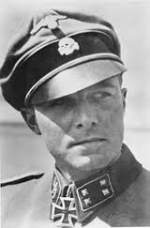
1946 SS Col. Joachim Peiper is sentenced to death (by hanging) for the shooting of American prisoners at Malmedy. Peiper is taken to Landsberg Prison to await execution. Note: Five years later, in 1951, he will still be waiting, and in December 1956, he will be paroled. (THP)
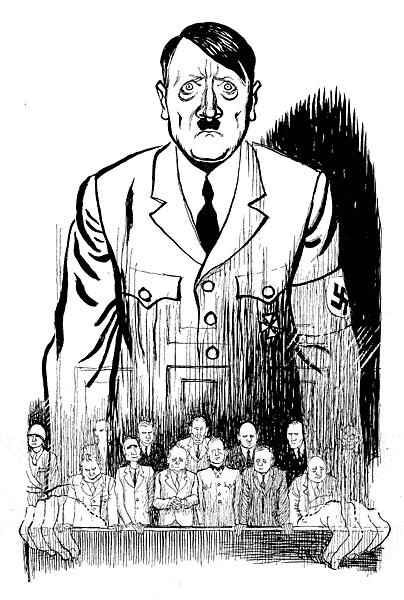
1946 Nuremberg Tribunal: Defense summations continue in the Major War Criminals Trial. One point in common with nearly all of the arguments of the various Defense Counsel is that there is a major absence among the Defendants; Adolf Hitler himself.
Dr. Alfred Seidl (Counsel for Defendant Frank):Adolf Hitler's attitude toward the conception of a State founded on law, insofar as any doubt could still have been entertained about it, has become perfectly clear through the evidence presented at this Trial. Hitler was a revolutionary and a man of violence. He looked on law as an impeding and disturbing factor in the realization of his plans in the realm of power politics. Incidentally, he left no doubt about this attitude of his and discussed the subject of the State founded on law in a number of speeches. He was always very reserved in his dealings with lawyers, and for this reason alone it was impossible from the outset that any close association could have developed between him and the Defendant Frank. The Defendant Frank considered it his life's work to see the conception of the State founded on law realized in the National Socialist Reich and, above all, to safeguard the independence of the judiciary.
Dr. Otto Pannenbecker (Counsel for Defendant Frick):I must go further into the charges which are made against the Defendant Frick with respect to the persecution of members of the Jewish race. Frick did collaborate in legal measures, particularly the Nuremberg Laws, and in administrative measures which he regarded as an expression of a National Socialist racial policy. On the other hand there is no proof that Frick himself shared in or knew of the measures of physical extermination which, on Hitler's direct orders, were carried out by Himmler and his organizations and kept absolutely secret from those who themselves had no part in these frightful events.
Dr. Hanns Marx (Counsel for Defendant Streicher):The question of whether the German people in its totality had known and approved of these actions was, and is, the truly fateful question. It is the touchstone by which the decision must be made as to whether or not Germany will ever be able to return again as a nation with equal rights into the common cultural and spiritual sphere of the world. As in every case of guilt, there immediately arose here also the question as to who was responsible, and the search for that individual. Who had ordered these atrocities, who had carried them out, and how could such inconceivable things have happened at all, the like of which cannot be found in history even in the earliest days?
During all this asking and guessing, the news arrived that the former Gauleiter of Franconia and publisher of Der Stuermer, the present Defendant Julius Streicher, had fallen into the hands of the American troops. From the echo this news aroused in the press, which was exclusively directed and published by the occupying power, as well as in the radio news, it was to be gathered that the world was of the opinion that in the person of Julius Streicher not only had one of the numerous anti-Semitic propaganda agents of the Third Reich been taken prisoner, but in short Enemy Number One of the Jews.
Throughout the rest of the world the opinion evidently prevailed that in the person of Julius Streicher not only the most active propaganda agent for the persecution and extermination of the Jews had been seized, but that he had also participated to the highest degree in carrying out these acts of extermination. He was said to have been, as one heard, not only the greatest hater of the Jews and the greatest preacher of extermination of the Jews, but also the person to whose direct influence one could trace back the extermination of European Jewry.
It is only from this angle that it can be explained why the Defendant Streicher should sit here in the dock, together with the other defendants, among those chiefly responsible for the National Socialist system. For neither by virtue of his personality nor measured by his offices and positions does he belong to the circle of leaders of the NSDAP or to the Party's decisive personalities. This view was probably also held in the beginning by the Prosecution, but was abandoned by them at an early stage, for the written Indictment already no longer charged the Defendant Streicher with any personal and direct part in the abominable mass murders. Rather did it state that there was less guilt with which he would be charged than in the case of any of the other defendants; only his propaganda, his activities by the written and spoken word, were made the subject of the accusation against him.
Edited by Levi Bookin (Copy editor)
levi.bookin@gmail.com



Click to join 3rdReichStudies



Disclaimer: This site includes diverse and controversial materials—such as excerpts from the writings of racists and anti-Semites—so that its readers can learn the nature and extent of hate and anti-Semitic discourse. It is our sincere belief that only the informed citizen can prevail over the ignorance of Racialist "thought." Far from approving these writings, this site condemns racism in all of its forms and manifestations.
Fair Use Notice: This site may contain copyrighted material the use of which has not always been specifically authorized by the copyright owner. We are making such material available in our efforts to advance understanding of historical, political, human rights, economic, democracy, scientific, environmental, and social justice issues, etc. We believe this constitutes a "fair use" of any such copyrighted material as provided for in section 107 of the US Copyright Law. In accordance with Title 17 U.S.C. Section 107, the material on this site is distributed without profit to those who have expressed a prior interest in receiving the included information for research and educational purposes. If you wish to use copyrighted material from this site for purposes of your own that go beyond 'fair use', you must obtain permission from the copyright owner.
Please Note: The list-owner and moderators of 3rdReichStudies are not responsible for, and do not necessarily approve of, the random ads placed on our pages by our web server. They are, unfortunately, the price one pays for a 'free' website.